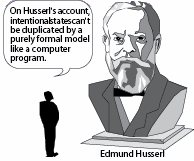Meanings and mental states are intentional according to Husserl not because of any relation they bear to anything else, but as a matter of their intrinsic character.
There are formal, rule governed aspects of mental states, but those aspects do not exhaustively characterise mental states. Mental states can't be reduced to formal strucutres even if they have formal aspects.
As such mental states cannot be duplicated by formal computer models.

Ronald McIntyre 1986. The Husserl quote is from p.109.